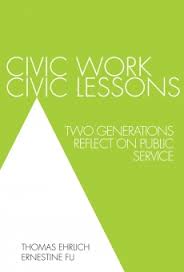By Sam Kolodezh
Released by University Press of America June 27, 2013, Civic Work, Civic Lessons: Two Generations Reflect on Public Service by Thomas Ehrlich and Ernestine Fu is truly a unique insight into public service and its changes and trends over the past several decades. Written as a collection of lessons and stories gathered from an array of civic leaders, the book is both accessible and profound in its humility and its depth.
The concept of the book first began with Ehrlich, who has pursued his passion for public service throughout his life and career. Ehrlich has held a number of public-service positions since the administration of President John F. Kennedy. He was the first head of the Legal Services Corporation and was director of the agency responsible for foreign-aid policy, reporting directly to President Jimmy Carter. He has also served as president of Indiana University, provost of the University of Pennsylvania, and dean of Stanford Law School. A truly exceptional individual, he has also authored several other books concerning education and public life.
Ehrlich wished to write a book that would encourage young people and those that mentor them to think about public service and how individuals gain satisfaction from public service in varying ways. He initially spoke to a publisher who recommended that he find a young voice to be representative of the many young voices and to gain a better understanding of how and why young people engage in public service. Through his search he found Ernestine Fu, a sophomore at the time in the Stanford engineering program.
Fu has been engaged in civic work since she was fifteen when she founded a nonprofit organization to bring music to those in need. She has served on a national corporate advisory board to fund youth civic activities, has worked at a venture-capital firm emphasizing investments in high-tech Silicon Valley start-ups, and was chosen for the Kauffman Fellowship on entrepreneurship. Also a truly exceptional individual, Fu has been balancing her dedication to civic service with her passion for engineering, and in the spirit of the liberal arts has been able to allow these two ways of knowing to cross and blend for her vision of the better good.
The book took three years to compile and write, and is a combination of lessons Ehrlich gleaned from his experience in federal government and those of Fu and other young people. Fu was central to bringing together 70-80 young people in focus groups to hear stories of their civic work and wrote most of the sections detailing lessons and stories from her own and other young people’s experiences.
There are seven lessons in the book that cover a gambit of topics concerning civil service and make projections for the future of civic work. Ehrlich and Fu believe that anyone can engage in civic work and find that the motivations of engaging in public service are mixed and the rewards not always apparent. They project that technology is the way of the future in civic service and identify four key steps for utilizing technology to make a civic work campaign successful.
The landscape of social leadership and civic work is vastly different today than it was when Ehrlich was in his youth. Rather than joining a large organization or going into government work, many young people are starting non-profits and utilizing technology to target and fix local problems that they find in their communities. The work of this generation is both more global and more fragmented. It is taking different forms, but both Fu and Ehrlich emphasize that social work needs to happen online and on the ground; there must be awareness and action.
Though fragmented, the landscape of social work today finds these fragments uniting under large causes like sustainability or gender equality. There is perhaps no longer a singular goal, but rather a singular project with different people pursuing the solutions to problems in different and sometimes competing ways and ideologies. Everyone working on social and civic projects, however, has one goal: to make the world a better place for local and global communities. The millennial generation is not the apathetic generation. It is generation that recognizes the power of infinite difference and the unity of a better world. Civic Work, Civic Lessons is a guide to how this work has happened, how it is happening, and how it should happen.
Sam Kolodezh is a member of Phi Beta Kappa and a senior at the University of Washington majoring in English and philosophy. The University of Washington is home to the Alpha of Washington chapter of Phi Beta Kappa.




